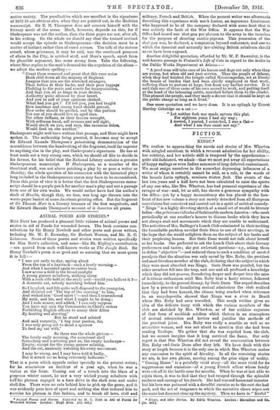Al DIAL POEMS AND STORIES.* Mass NOTT has produced a
pleasant little volume of animal poems and stories in aid of Funds for wounded horses. The book contains con-
tributions by Sir Henry Newbolt and other poets and prose writers, including Mr. W. F. Rawnsley, Sir Herbert Warren, and Mr. R. C. Lehmann. Some of these poems and stories were written specifically
for Miss Nott's collection, and some—like Mr. Kipling's contribution. —are quoted from such well-known works as The Jungle Book. Sir
Henry Newbolt's poem is so good and so amusing that we must quote It in full :— " I was out early to-day, spying about
From the top of a haystack—such a lovely morning—
And when I mounted again to canter back I saw across a field in the broad sunlight A young gunner subaltern, stalking along With a rook-rifle held at the ready and—would you believe it 1- A domestic cat, soberly marching behind him.
So I laughed, and felt quite well-disposed to the youngster, And shouted out The top of the morning' to him, And wished him Good sport ! '—and then I remembered My rank, and his, and what I ought to be doing ; And I rode nearer, and added, ' I can only suppose You have not seen the Commander-in-Chiefs orders Forbidding English officers to annoy their Allies By hunting and shooting.'
But he stood and saluted And said earnestly, I beg your pardon, Sir, I was only going out to shoot a sparrow To feed my cat with.'
So there was the whole picture— The lovely early morning, the occasional shell Screeching and scattering past us, the empty landscape— Empty, except for the young gunner saluting, And the cat, anxiously watching his every movement.
I may be wrong, and I may have told it badly, But h struck me as being extremely ludicrous."
That is a poem which appeals rather specially to the present writer; for he remembers' an incident of a year ago, when he was a visitor at the front. Coming out of a trench into the blaze of a gorgeous winter sunset, he saw a very wicked young subaltern with half his platoon engaged in a hare drive in the shell zone and under
shell-fire. There wore no cats behind him to pick up the game, and it was evidently pure love of sport and nothing else that induced him to exercise his platoon in this fashion, and to break all laws, civil and
Wounded Horses. London: Hugh sees. 16d. net.] • dn;rnal Poems and Stories. Collected by H. L. Nott In did of Funds for
military, French and British. When the present writer was afterwards describing this experience with mock horror, an ingenuous Lieutenant who happened to bo of the company declared with some heat that it was entirely the fault of the War Office. It appears that the War Office had issued one shot-gun per platoon to the army in the trenches for the purpose of shooting carrier-pigeons. This possession of the shot-gun was, he declared, a temptation beyond endurance, and one to which the innocent and naturally law-abiding British subaltern should never have been exposed.
Another delightful quotation, afforded by Mr. W. F. Rewnsley, is the well-known passage in Plutarch's Life of Cato in regard to the mules in the Public Works Department at Athens :— "A good man will take care of his horses and dogs net only when they are young, but when old and past service. Thus the people of &hems, when they had finished the temple called Hecatompedon, set at liberty the boasts of burden that had been chiefly employed in that work, suffering them to pasture at large, free from any further service. It is said that one of these came of his own accord to work, and putting itself at the head of the labouring cattle, marched before them to the citadeL This pleased the people, and they made a decree that it should be kept at the public charge as long as it lived."
One more quotation and we have done. It is an epitaph by Ernest Hartley Coleridge on a cat :—
" Let neither fork nor spade upturn this plat. For eighteen years I had my way ;
I mewed, I purred, I scratched, I was a Cat— And what I am thou cant not say."


























 Previous page
Previous page